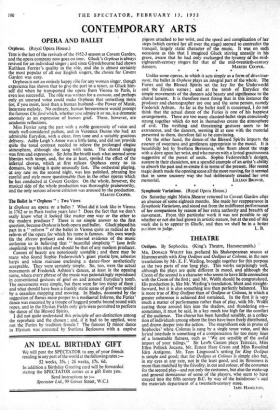The Ballet in " Orpheus " : Two Views Is
Orpheus an opera or a ballet ? What did it look like in Vienna in 1762 or in Paris twelve years later ? Does the fact that we don't really know what it looked like matter one way or the other to the modern producer ? There is no simple answer to the first question, because Orpheus is both opera and ballet. Gluck played his part in a " reform " of the ballet in Vienna quite as radical as the reform of the opera for which his name is famous. His own words (in the Alceste preface) and the internal evidence of the music authorise us in believing that " beautiful simplicity " (una bella simplicini) was his ideal and should be that of any modem producer. Canons of beauty are notoriously unstable ; and there may be many who found Sophie Fedorovitch's giant plastic lyre, asbestos harps and white staircase enclosing a dance-floor aesthetically acceptable. They were certainly simple. So, too, were the actual movements of Frederick Ashton's dances, at least in the opening scene, where every phrase of the music was painstakingly reproduced in conventional gestures of grief on and around Eurydice's tomb. The movements were simple, but there were far too many of them ; and what should have been a frankly static scene of grief was spoiled by a ceaseless mopping and mowing. In Hades, decorated by the suggestion of flames more proper to a mediaeval Inferno, the Furies' dance was executed by a troupe of haggard youths bound round with ropes, and in the Elysian Fields only girls were permitted to perform the dance of the Blessed Spirits.
I did not quite understand this principle of sex-distinction among the reprobate and the chosen ; and, if it had to be applied, were not the Furies by tradition female ? The famous l? minor dance in Elysium was executed by Svetlana Beriosova with a captive pigeon attached to her wrist, and the speed and complication of her steps (which carried her all over theotage) seemed to contradict the tranquil, largely static character of the music. It was on such occasions as this that I imagined Gluck stirring uneasily in his grave, aware that he had only exchanged the tyranny of the mid- eighteenth-century singers for that of the mid-twentieth-century


































 Previous page
Previous page